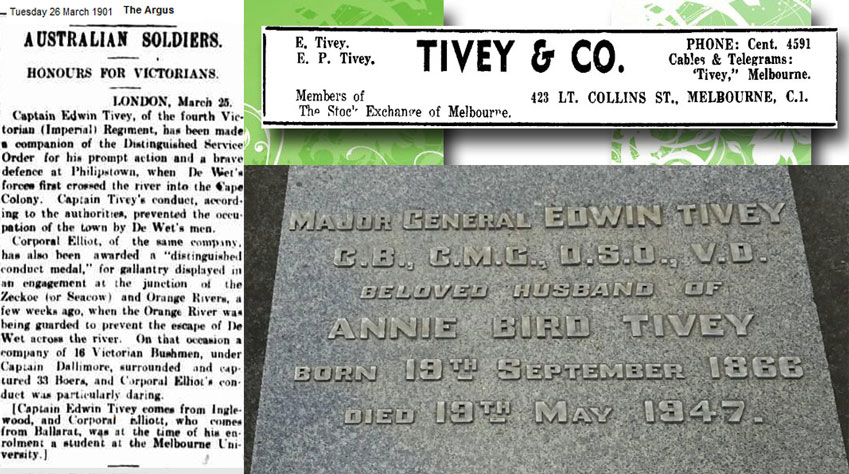Major-General-Edwin-Tivey-of-The-Australian-Imperial-Force
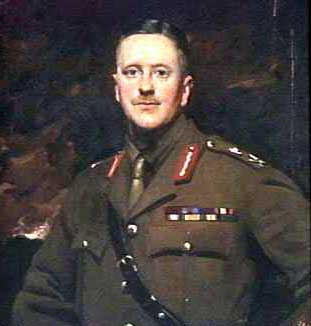 TIVEY, EDWIN (1866-1947), soldier and
stockbroker, was born on 19 September 1866 at Inglewood,
Victoria, fourth surviving child of Joseph Tivey, an
English-born storekeeper who had arrived in Australia in 1848 at
the age of 14, and his wife Margaret, née Hayes, from Tasmania.
Joseph’s father (Edwin's Grandfather) was Samuel Tivey born 5th
December 1814 in Melbourne Derbyshire. He married Phoebe Wild in
Derby on 9th February 1833. Joseph was the eldest of 9 children
born to the couple who sailed on the ship Bormendsey" at Eden,
Twofold Bay, NSW, proceeded to Menare and took up land at
Nimitybelle. Joseph was listed as James on the ship's manifest.
He documented his journey to Australia in a diary (contact us
for a copy) Edwin was educated at All Saints Grammar School, St
Kilda, and at Wesley College, Melbourne, where he rowed bow in
the second crew of 1882. 'No scholastic genius', he eschewed
university to return to Inglewood as an accountant. He was
commissioned lieutenant in the Inglewood detachment of the
Victorian Rangers in 1889 and promoted captain in 1891.
Townsfolk elected him to the Inglewood Borough Council on which
he served for five years from 1894. In 1899 he became a founder
and first president of the local branch of the Australian
Natives' Association.
In May 1900 Tivey embarked for South Africa as a
captain in the Victorian 4th (Imperial) Contingent. Serving in
widespread operations, he was mentioned in dispatches. He was
also awarded the Distinguished Service Order for leading forty
troops on a forced march to Philipstown on 11 February 1901. His
men drove back over 300 opponents, occupied the adjacent kopjes
and held them until reinforcements arrived.
TIVEY, EDWIN (1866-1947), soldier and
stockbroker, was born on 19 September 1866 at Inglewood,
Victoria, fourth surviving child of Joseph Tivey, an
English-born storekeeper who had arrived in Australia in 1848 at
the age of 14, and his wife Margaret, née Hayes, from Tasmania.
Joseph’s father (Edwin's Grandfather) was Samuel Tivey born 5th
December 1814 in Melbourne Derbyshire. He married Phoebe Wild in
Derby on 9th February 1833. Joseph was the eldest of 9 children
born to the couple who sailed on the ship Bormendsey" at Eden,
Twofold Bay, NSW, proceeded to Menare and took up land at
Nimitybelle. Joseph was listed as James on the ship's manifest.
He documented his journey to Australia in a diary (contact us
for a copy) Edwin was educated at All Saints Grammar School, St
Kilda, and at Wesley College, Melbourne, where he rowed bow in
the second crew of 1882. 'No scholastic genius', he eschewed
university to return to Inglewood as an accountant. He was
commissioned lieutenant in the Inglewood detachment of the
Victorian Rangers in 1889 and promoted captain in 1891.
Townsfolk elected him to the Inglewood Borough Council on which
he served for five years from 1894. In 1899 he became a founder
and first president of the local branch of the Australian
Natives' Association.
In May 1900 Tivey embarked for South Africa as a
captain in the Victorian 4th (Imperial) Contingent. Serving in
widespread operations, he was mentioned in dispatches. He was
also awarded the Distinguished Service Order for leading forty
troops on a forced march to Philipstown on 11 February 1901. His
men drove back over 300 opponents, occupied the adjacent kopjes
and held them until reinforcements arrived.
In 1903 Tivey became a member of the Melbourne Stock Exchange.
On 26 September 1906 he married Annie Bird Robb (d.1921) at the
Presbyterian Church, Toorak. A captain in the new 9th Light
Horse Regiment of the Victorian militia, in 1906 Tivey was
appointed brigade major in the Victorian 3rd Light Horse Brigade
and in 1911 as lieutenant-colonel became its commander. He
received the Volunteer Officer's Decoration in 1910.
By the commencement of World War I Tivey was a successful
stockbroker and temporary colonel commanding the Victorian 5th
L.H.B. He was promoted colonel in January 1915 and was
commandant of the officers' school at Broadmeadows. 'Of neat
build, middle height, crisp appearance, he looks every inch a
soldier', observed Melbourne Punch.
In July Tivey was appointed commander of the Australian Imperial
Force's 8th Infantry Brigade which he personally helped to
recruit. He quickly endeared himself to men of all ranks with
his sincerity and his concern for their interests. In December
the brigade disembarked in Egypt where it held a sector of the
Suez Canal defences. Its men were soon dubbed 'chocolate
soldiers' because, to relieve Moascar, they travelled by train
from Tel-el-Kebir while supporting troops marched for two days
through heat and sand. Thenceforth the brigade was known as
'Tivey's Chocs'.
Tivey was appointed temporary brigadier general in February 1916
and in June his brigade left with the Australian 5th Division
for France. It went into action at the battle of Fromelles and
continued to fight on the Western Front until the war's end. In
December 1916 Tivey was wounded in action but remained on duty.
For brief periods in 1917 and 1918 he temporarily commanded the
5th Division when Major General (Sir) Talbot Hobbs was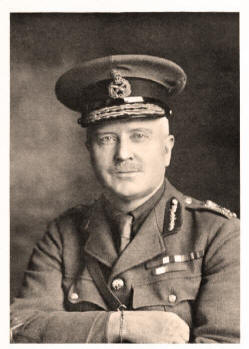 absent.
Tivey was again wounded at Westhoek Ridge, Belgium, in October
1917 and was gassed in May 1918. In the great allied offensive
of 8 August 1918 his brigade captured 831 prisoners and 85
machine-guns. During the war he was mentioned in dispatches six
times; he was appointed C.B. in 1917 and C.M.G. in January 1919.
absent.
Tivey was again wounded at Westhoek Ridge, Belgium, in October
1917 and was gassed in May 1918. In the great allied offensive
of 8 August 1918 his brigade captured 831 prisoners and 85
machine-guns. During the war he was mentioned in dispatches six
times; he was appointed C.B. in 1917 and C.M.G. in January 1919.
From late November 1918 to May 1919
Edwin was temporary major
general, again temporarily commanding the 5th Division. In July
1919 he embarked for Australia where, in the reserve of
officers, Australian Military Forces, he was promoted major
general in June 1920. In 1921-26 he commanded the 2nd Cavalry
Division of the Citizen Military Forces. Governor-General Lord
Forster undervalued Tivey in 1925 by describing him as 'a nice
little man who fancies himself a bit'. Having resumed trading as
a respected and well-known member of the Melbourne Stock
Exchange, from 1920 Tivey lived in a small mansion, Nauroy,
Kooyong Road, Toorak, and worshipped at nearby St John's
Anglican Church. He was an honorary colonel in the Victorian
mounted rifles from 1928 and, from 1932, in the Victorian 32nd
Battalion. On his eightieth birthday he was described as a
'silver haired dapper sharebroker [who] retains his soldierly
bearing' and 'attends his office every day'.
Tivey died at his Toorak home on 19 May 1947 and was buried with
full military honours by the bishop of Geelong in Brighton
cemetery, Melbourne. His estate was sworn for probate at
£75,303, the principal beneficiary being his daughter Violet.
His son Major Edwin Peter Tivey had died as an Italian prisoner
of war in 1943.
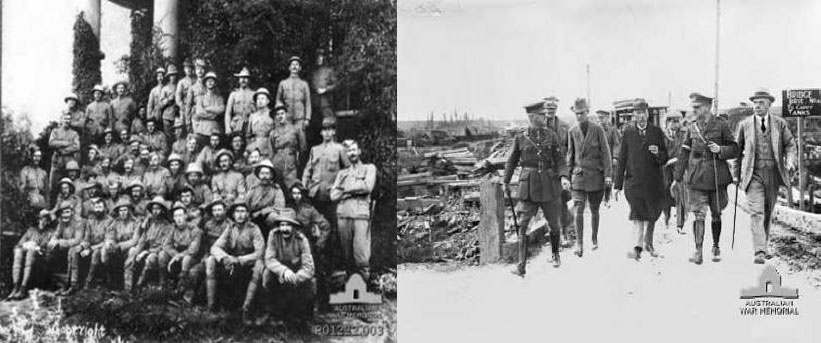
Above Left- Taken in 1901 - Group portrait of members of C Squadron, 4th Victorian Imperial Bushmen outside their headquarters in Grahamstown, South Australia. Right: The Prime Minister of Australia, the Right Honourable W. M. Hughes, with Lieutenant General Sir John Monash, Brigadier General (Brig Gen) E. Tivey, and party, during a visit to the Australian front in 1918, Somme, France (Copyright The Australian War Memorial)
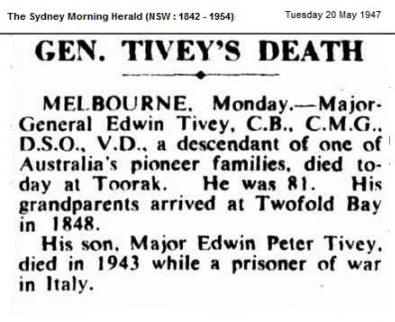
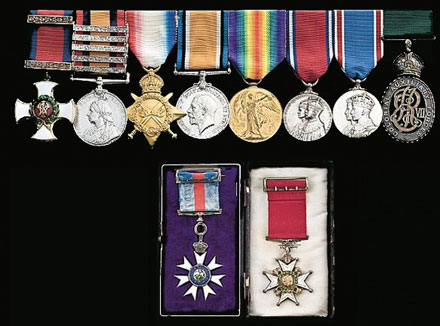
The medals Major General Edwin Tivey earned over his long established military career including The Outstanding Boer War D.S.O, Great War C.B, C.M.G and group of seven other Boer War and World War I medals.
Below: An Article from The Argus, an advert promotong his Stockbroker business and a photo of his grave monument.
